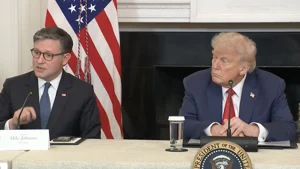Both chambers of Congress are in August recess, and Republican lawmakers are using the time to promote the tax cuts passed in President Donald Trump’s “one big, beautiful bill.”
Democrats, in contrast, are highlighting the estimated $4.1 trillion the OBBB will add to the national debt by 2034 (when accounting for interest), mostly due to the permanent extension of key provisions in the 2017 Tax Cuts and Jobs Act.
That includes the boosted maximum standard deduction and cross-bracket tax cuts, the 20% Qualified Business Income deduction, and the $2,000 maximum Child Tax Credit.
But if lawmakers were to later make permanent some 10 temporary tax provisions in the OBBB – including deductions for some tipped workers, a boosted CTC, and a $6,000 deduction for seniors – the OBBB would add $5 trillion to the national debt by 2034, according to a new report.
The Congressional Budget Office’s estimate, requested by Democrats on the House Budget Committee, maintains that if those tax provisions were permanently extended, “overall debt‑service costs would total $789 billion over the 10‑year period. That change would increase the cumulative effect on the deficit to $5.0 trillion.”
The national debt is currently $36 trillion and is projected to surpass $50 trillion by 2034.
“Each and every analysis from the nonpartisan Congressional Budget Office continues to show the same result regardless of how you look at it: this bill explodes the debt by trillions of dollars,” Ranking Member Jeff Merkley, D-Ore., said. “It is the height of hypocrisy coming from the party that claims to be fiscally responsible.”
Before the OBBB passed, Republican leaders had promised deficit-wary constituents that they would pair any provisions in the bill resulting in lost revenue with dollar-for-dollar spending cuts or provisions boosting economic growth.
While House committees largely followed those promises by authorizing a ten-year tax cut extension with offsetting spending cuts, Senate committees leaped far out of the fiscal bounds established by the budget reconciliation’s original blueprint.
Because extending the tax cuts permanently would cost more than lawmakers could realistically cut, the Senate changed its accounting methods to paper over the entire cost. Under the current policy baseline, the OBBBA costs only $441 billion by 2034, as The Center Square reported. Nearly all budget organizations however, including CBO, denounced the tactic as a “gimmick.”
Due to the deficit impact and other concerns, House Speaker Mike Johnson, R-La., has floated the idea of a second budget reconciliation package, which could include more spending offsets or pro-growth provisions to help soften the fiscal blow.






